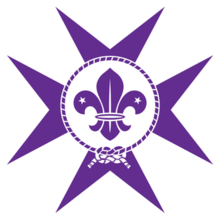Scout Association of Malta
| The Scout Association of Malta | |||
|---|---|---|---|
 | |||
| Country | Malta | ||
| Founded | 1913/66 | ||
| Membership | 3,100 | ||
| Chief Scout | Mr. George Cassar | ||
| Affiliation | World Organization of the Scout Movement | ||
|
| |||
| Website scout.org.mt | |||
The Scout Association of Malta is the World Organization of the Scout Movement recognised Scouting association of the island nation of Malta. Scouting in Malta began when 1st Sliema Scout Troop was registered in 1909 as the second overseas troop to be part of the Scout Association of the United Kingdom. It was officially recognised a year later.
The Scout Association of Malta was created as an organisation in 1908, and was responsible for supervising Scouting activities on the island. However, it remained a part of the United Kingdom's association as a member of the British Empire until 1966. As of 2011, there were 2,936 members on the island.[1]
The Scout Motto is Kun Lest, translating as Be Prepared in Maltese. The membership badge of the Scout Association of Malta prominently features the Maltese eight-pointed cross.
History

Scouting appeared on the island of Malta very soon after the experimental Scouting camp on Brownsea Island was conducted by Robert Baden-Powell in August 1907. The 1st Sliema Scout Troop applied for recognition on October 12, 1909, and this was received a year later. At this time there were 338 Boy Scouts and 3 Scoutmasters listed as members of the Malta Boy Scouts Association.[2]
The association was formerly registered as an Overseas Branch of The Boy Scouts Association on 15 September 1913.
The First World War had a significant impact on Scouting on Malta, since most of the Scoutmasters were also servicemen and were ordered to the front in Europe. Many of the Scouts also volunteered for duties as interpreters, coast watchers and messengers, as well as to serve in hospitals and other support establishments. By the end of 1915, there were 84 Scouts on war duty from the island, and only 105 Scouts and leaders on Malta. However, as the latter half of the war progressed, membership rose sharply, and the association's general meeting on 30 November 1917, reported 1,200 members with 28 Scout Troops on the island.
The Second World War saw similar service from the Maltese Scouts, as they supported the Allied forces throughout the aerial siege of 1940 to 1943. This resulted in the association and its members receiving a collective award of the Bronze Cross, "in recognition of their courage and devotion to duty in the face of continuous enemy action in the war for freedom".
The island of Malta became an independent state in 1964. In October 1966, It was decided at an extraordinary general meeting of the Malta Boy Scouts Association that it should remove itself from The Scout Association of the United Kingdom and seek direct membership of the World Scout Conference. The association was recognised as an independent organisation in December 1966, with Lady Olave Baden-Powell, acting as the Vice-President of the World Bureau, presenting the certificate to the Chief Scout of Malta.
In 2007, the association inaugurated the Beaver section.
Organisation
The Scout Association of Malta is currently divided into 4 Scout Districts, and a total of 40 Scout Groups, with 2,500 members as of December, 2001. The island of Malta itself comprises three of the Districts, with the fourth being the neighbouring island of Gozo which currently has two of the Groups, Victoria Scout Group and Xaghra Scout Group.
There is a Chief Scout and an Island Headquarters of around 15 leaders and administrators.
The Scout programme is divided into sections based on age groups, with Beavers, Cub Scouts, Scouts, Venture Scouts and Rover Scouts.
Connections with Baden-Powell
As well as its claim to having the first official overseas Scouting organisation, Malta has other connections to the founder of Scouting. Robert Baden-Powell's uncle, Henry Augustus Smyth, was governor of the island in 1890-1893. Baden-Powell himself served as Assistant Military Secretary for his uncle during these years, and also as Intelligence Officer for the Mediterranean.
Baden-Powell would return many times to the island, including as part of his honeymoon with Lady Olave, and maintained a fondness for the island and the Maltese Scouters. Shortly before his death in 1940, Baden-Powell wrote in a final letter to the island's Scouts:
- to congratulate my old friends, the Maltese on the plucky way they have stood up to the infernal bombing of the Italians ... They have the spirit of fearlessness and patience which enables them to face danger with a smile to stick it out to the triumphant finish ...[3]
See also
References
- ^ "Triennal review: Census as at 1 December 2010" (PDF). World Organization of the Scout Movement. Retrieved 2011-01-13.
- ^ "Milestones of Scouting in Malta". The Scout Association of Malta. Archived from the original on 2007-09-08. Retrieved 2007-01-08.
- ^ "History of Scouting in Malta". The Scout Association of Malta. Archived from the original on 2006-11-30. Retrieved 2007-01-08.




